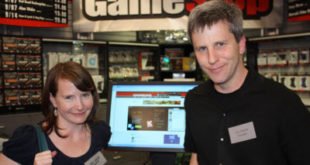If you saw The Game Awards, then you known Call of Duty and Dead Space veterans are creating The Callisto Protocol, a new survival horror game coming in 2022.
Striking Distance Studios has quickly built a team of 150 developers in San Ramon, California, to create a science fiction game in the survival horror genre. Glen Schofield, former co-head of Call of Duty studio Sledgehammer Games, started the company last year and got funding from Krafton (PUBG Corp).
Schofield brought aboard Dead Space veterans such as Steve Papoutsis, chief development officer. The game is targeted for launch on the PC and consoles in 2022, and it is set (surprisingly) in the future of the PlayerUnknown’s Battlegrounds universe. But The Callisto Protocol‘s trailer feels like a spiritual successor to Dead Space, with a touch of Alien thrown into it.
Set on Jupiter’s dead moon Callisto in the year 2320, the storytelling, horror, and action game will challenge players to escape the maximum-security Black Iron Prison and uncover its terrifying secrets. It’s a very ambitious game and one that has been built almost entirely remotely so far during the pandemic.
A 25-year game veteran, Papoutsis was previously the general manager at Visceral Games before Electronic Arts shut it down. He oversaw the production of the Dead Space franchise and Battlefield: Hardline. He also oversaw the studio’s contributions to other Battlefield games and was a producer on the James Bond 007 and The Lord of the Rings franchises. I spoke with him after the debut of the cinematic trailer on The Game Awards.
Here’s an edited transcript of our interview.

Above: Steve Papoutsis is chief development officer at Striking Distance Studios.
GamesBeat: You had a big night at The Game Awards. That must have drawn a strong reaction.
Steve Papoutsis: It was exciting to be able to show what we’re doing to the world. People seemed genuinely interested. It’s a pleasure and an honor to work on things people care about. It’s a lot of fun.
GamesBeat: It has that Dead Space vibe to it. How intentional was it to create something in that sort of spiritual successor space? Is that something you thought about as you conceived the game?
Papoutsis: The honest answer is, our team is assembled from many ex-Dead Space developers. It’s kind of in the DNA. I was at Visceral for years as the general manager and vice president, and I was on every Dead Space game, including the Wii game. But our focus is to create a great experience on its own merits. That’s what we hope the Callisto Protocol will become for players.
GamesBeat: What about survival horror was more interesting? Given everyone’s history, you could have gone toward a first-person shooter as well.
Papoutsis: At its heart, Glen and the team are passionate about putting together a narrative-driven experience, leveraging past experiences. This particular genre is something the team is excited about.
GamesBeat: It feels like it was also a bit untouched out there. It’s not as crowded a market as shooters.
Papoutsis: Thinking back, certainly with our past experiences and the enjoyment we get out of that particular area of the space, it’s a good observation, but it’s not necessarily something that motivated us. What really motivates Glen and the team is just a unified passion for this type of game. It’s fortuitous, to your point, that perhaps there’s a space for it. But our drive to do the game is based on a passion for this type of experience.

Above: The Callisto Protocol takes place on one of Jupiter’s moons.
GamesBeat: How early on did you start with Striking Distance?
Papoutsis: Glen and I were talking about it before it was a thing. I guess officially I am employee number one.
GamesBeat: I heard last night that the team is up to about 150 people.
Papoutsis: We’ve been fortunate to attract and assemble 150 developers to work with us on the game so far. It’s been a fun and interesting ride.
GamesBeat: Do you consider that to be full strength?
Papoutsis: When we talk about 150 people, a studio is comprised of all types of individuals. Hands on, putting content in the game, making content, it’s certainly less than 150. Especially in today’s world, with the circumstances we’re in, we need a lot of support. We have a wonderful IT department, our operations department, finance department, HR, marketing, and so on. But we feel pretty good about the number of people we have in total. We’re always looking for other great developers to join. You can never have too many talented people.
GamesBeat: That says a lot about the ambitions here. It’s fully triple-A, a game that requires a lot of work.
Papoutsis: It’s an undertaking. What’s been wonderful about Striking Distance Studios so far has been the support from Krafton. They’ve been really supportive of the creative process. They want to do as much as is needed to support us, and they’re comfortable allowing the creative process to take its course. They understand, having supported and made so many games over the years, including PUBG, what it takes to make a game these days. We’re lucky.
GamesBeat: It speaks to what happens when you show up with intentions to get something big under way. Glen has his reputation, and Krafton has a big budget available. You can bring on 150 people when a lot of companies would struggle to bring on 10.
Papoutsis: Again, we’re fortunate and we’re thankful to have this opportunity. Making games is hard these days. We’re excited about getting to do this.
GamesBeat: Has it been about a year now? How long have you been recruiting and bringing in people?
Papoutsis: We’re going on 18 months, about a year and a half. It’s been a bit. We’ve been actively trying to attract and assemble an awesome team.

Above: The Callisto Protocol takes place in the PlayerUnknown’s Battlegrounds universe.
GamesBeat: With a couple more years to go, does that feel like a reasonable timetable, or a very aggressive one? We’ve seen a lot of original IPs take a lot longer these days.
Papoutsis: As a developer, someone who’s worked on tons of games for the last 26 years–every project is ambitious. I’ve never been on a project where I thought, “Oh, it’s in the bag. We’ve got plenty of time.” That’s never been something that’s come to mind. We’re trying to pour in as much quality and fun as possible with the minutes we have available to work on these things. It sounds pretty good right now. We’ll see as time progresses. To your earlier point, it’s a challenging time to make games. We’re happy to have that runway.
GamesBeat: That brand-new building of yours, you still can’t move in, right?
Papoutsis: We got in there for a couple of weeks and soak it in. But as soon as world events went the way they did, we thought about the team and asked everyone to go home. Of course everything progressed from there in terms of state mandates and so on. Unfortunately we haven’t been able to really use and appreciate it. But we’re excited to get back there.
GamesBeat: What was the thinking as far as the Game Awards announcement?
Papoutsis: Glen is friends with Geoff, and I also know him from other projects. It seemed like a great place to share what we’re up to with the world. Lots of people were tuned in, which was amazing. The reaction has been nice to see. It felt like a great moment. Now, especially with the way things are, it’s probably the best vehicle through which to make the announcement, given how everyone’s at home. It’s awesome that groups like that are trying to support the development community and do something like that. It’s fun. We’re happy that we got to participate.
GamesBeat: Do you think it will help with further recruiting, getting the game out there like that?
Papoutsis: You touch on something that’s exciting for us. We’re building a studio, a brand-new studio, and a brand-new game. Any exposure really does help people find out about us. We have two things that we’re trying to do, right? We want people to know Striking Distance Studios, and then of course the Callisto Protocol.
GamesBeat: What details would you call out in what we saw about the game? I spotted some framing that reminded me of the Alien movies, a giant mouth about to bite someone’s head off.
Papoutsis: Yeah, yeah. There are elements there that definitely kindle the imagination. If we were to go down the list of what we saw, we learned that the Callisto Protocol is a story-driven survival horror game. It takes place in a location called the Black Iron Prison on Jupiter’s dead moon of Callisto. The game takes place in the future. As we learn more and talk more about the game moving forward, players will uncover the dark secrets that lie within this facility.

Above: The Callisto Protocol is spooky like the Dead Space franchise.
GamesBeat: Why was that the setting you chose for what you want to do?
Papoutsis: When we started talking about the game initially, one thing we were–we’re really into horror, the notion of creating something terrifying. And so we thought, what are locations that inherently instill an emotion in someone? When you think of something like a prison, that’s a pretty tough, scary type of backdrop. That was intriguing. And then of course without getting too deep into the story, it just lent itself to the overall story we wanted to tell.
GamesBeat: I looked at the Back 4 Blood demo. What was interesting to me there was what seems possible in the next generation. It’s the same kind of game, four-player co-op against zombies, that Left 4 Dead was, but it looks so much better, and just as snappy in the gameplay. The effects you can see in the lighting, the smoke, brought home to me that this is what a next-gen game can look like. How do you think about that as far as approaching survival horror with this technology?
Papoutsis: For me, this is an exciting time. We’ve been through this a number of times. When these transitions happen, it creates new opportunities for creativity. These consoles are amazing, and they continue to get more advanced and create more opportunities for developers to express their creativity. What you’re seeing, it’s exciting and fun, but it always comes back around to the premise and the core ethos, so to speak, of what you’re making. Making sure that’s fun and delivering a memorable experience. These consoles and computers support that effort. It unlocks the ability for developers to express their creativity and passion.
We’re going to lean into the DNA from the people we’ve assembled. A lot of those people are veterans of things like Dead Space, so certainly we’ll go to our past experience and leverage that as far as how we go about setting up moments and tension and excitement throughout the experience. We hope it will be a very Striking Distance Studios-flavored type of game.
GamesBeat: How much of this springs from Glen’s head ready to go, versus what you would have argued over or had the input of many people into?
Papoutsis: Glen’s great. He’s an extremely collaborative person. He values the creative process immensely. He’s always looking to the team to help with great ideas. It’s definitely something that we’ve all come together and helped contribute to. But as far as the top level — “I want to do a game like this” — Glen was definitely bring that from the get-go when we initially talked. That’s part of the reason, aside from just getting to work with someone I respect and enjoy being around, that made me excited about doing this project.

Above: Uh, look out behind you.
GamesBeat: Were you at all torn about going for a third-person game as opposed to a first-person game?
Papoutsis: No, I think we’ve always been fans of third-person, and of first-person. It’s just that for this particular experience we chose that camera perspective. Glen is passionate about this particular project. That was one of the things that attracted me about teaming up, that passion and clarity of vision in what we’re trying to accomplish. That’s the driver of what we’re doing. It’s galvanizing and fun, when you’re doing something because you’re passionate about it. We could have done a bunch of different things, but this is where we landed, and we hope we can deliver on it for players.
GamesBeat: What beats do you have to hit in the future, going from here?
Papoutsis: There will be lots of opportunities for us to catch up in the future. Right now we’re just trying to contain the excitement around finally getting to talk about the game, even at this level. One of the fun things about doing this is getting to talk about and share where we’re at. I don’t know the exact timeline at this point, but I hope we do get to connect more in the future.



